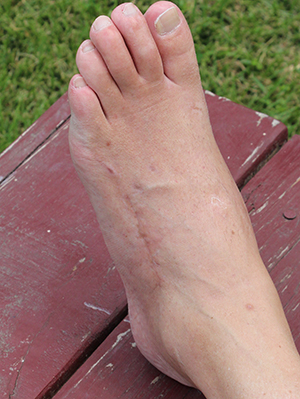As the new year begins, many people will resolve to quit smoking. Although most smokers realize the habit isn’t good for their hearts and lungs, Washington University orthopaedic surgeons remind them that lung and heart health aren’t the only reasons to quit. Smoking complicates bone healing, too.
“Smoking increases infection rates, makes problems with wound healing more likely and also interferes with bone healing,” said Jeffrey Johnson, MD, chief of the foot and ankle service for Washington University Orthopedics. “If you’re a smoker and have a fracture, that break doesn’t heal as fast and sometimes doesn’t heal at all.”
Tobacco plays a role in one of every five deaths in the United States, and in every year from 2000 to 2004, smoking was responsible for more than $193 billion in health-related costs in the country. Most smokers are aware that tobacco is unhealthy, but many are surprised to learn it can interfere with bone health.
Johnson is one of several orthopaedic surgeons at Washington University School of Medicine and Barnes-Jewish Hospital in St. Louis who advise patients that if they can’t stop smoking, it might be too risky to operate on them.

Barbara Feldman, of Wood River, was one of those patients. After a fall that caused a broken bone in her foot, Feldman developed severe complications.
“Even after the foot began to heal, it was still very painful, and it was growing out to the left,” Feldman said. “My foot was badly disfigured, and then my arch collapsed, and when I went to see Dr. Johnson, he started talking to me about smoking.”
That surprised her.
“He said it was going to be a long process after surgery to get the foot to heal, and if I continued to smoke, it was going to slow the healing process even more,” Feldman recalled. “I felt like I had to choose between continuing to smoke and possibly losing my foot, so that’s when I decided that I needed to quit smoking.”
As part of medical evaluation prior to surgery, Johnson and other orthopaedic surgeons, routinely ask patients whether they smoke because smoking can affect the success of many types of surgery.
“Smoking cessation prior to any major surgery is critical not only to the success of the surgery but also to recovery and rehabilitation needed afterward,” said Mario Castro, MD, director of the Washington University Center for Smoking Cessation. “As a lung doctor, I’m often called to see patients with complications after surgery, such as pneumonia or low oxygen levels, all because the patients didn’t stop smoking ahead of time.”
Medicare also requires physicians in many different specialties to identify patients who smoke and to counsel them about the effects of smoking.
“Patients aren’t surprised that a medical doctor has identified smoking as a health issue,” Johnson said. “What surprises them is that there’s a relationship between smoking and the particular orthopedic problem they’re having. They understand that cigarettes aren’t good for the heart and lungs, but we explain how taking a puff on a cigarette is going to have a negative impact on what’s happening with their feet or ankles.”
Unfortunately, because cigarettes are so addictive, many people are unable to stop smoking without help.

Patients who need help quitting smoking can be referred to a program, such as the Center for Smoking Cessation, where patients receive counseling and/or medications prior to surgery, according to Castro, the Alan A. and Edith L. Wolff Professor of Pulmonary and Critical Care Medicine and professor of pediatrics.
“It’s never too late to try to quit smoking,” he said.
Regarding bone health, Johnson explained that research shows the benefits of quitting accumulate quickly.
“If you stop smoking, your surgery — from the perspective of bone healing, tissue healing and infection risk reduction — improves,” he said. “Our message to patients is, ‘Yes, smoking increases your risks, but you also can reduce those risks significantly if you stop.’”
Washington University School of Medicine’s 2,100 employed and volunteer faculty physicians also are the medical staff of Barnes-Jewish and St. Louis Children’s hospitals. The School of Medicine is one of the leading medical research, teaching and patient-care institutions in the nation, currently ranked sixth in the nation by U.S. News & World Report. Through its affiliations with Barnes-Jewish and St. Louis Children’s hospitals, the School of Medicine is linked to BJC HealthCare.